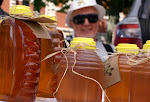Our grandparents knew the basics:
- Close blinds and curtains on the east side of your home in the morning and on the west side of your home in the afternoon. This will reduce the amount of solar gain - the energy of the sun entering your home and heating it up. An awning over southern windows can substitute for deep eaves, giving your home shade over these windows and reducing the solar energy coming into them.
- For the long term, deciduous trees planted to block southern or western afternoon sun can help tremendously. The leaves will fall off in winter, allowing for solar gain in the months where we need it the most.
- Turn off lights in rooms that you are not using.
- Open your windows as the evening cools; close them again in the morning. This traps the cool night air in your home, helping it stay cooler all day long.
- Keep doors closed as much as possible during the day. It is the same principle as keeping the refrigerator closed as much as possible during a power outage.
- Use fans to keep the air in your home moving. A fan in an occupied room can make it feel a little cooler. Another option is a whole house fan or attic fan to draw the hot air out of the top of the house. Two of our sellers have these installed in their homes (Monroe and Freeport) and rave about the efficacy.
- Clean the filter on a regular basis.
- Do not block the flow of air from the window unit or central air vents with furniture. Also be sure to keep the air return grills clear.
- Keep the thermostat set at 78 degrees or higher. Each degree higher reduces your summer heating costs by about 7%.
- When it is time to replace an older air conditioning unit, look for high-efficiency units with higher SEER ratings.







.jpg)


No comments:
Post a Comment